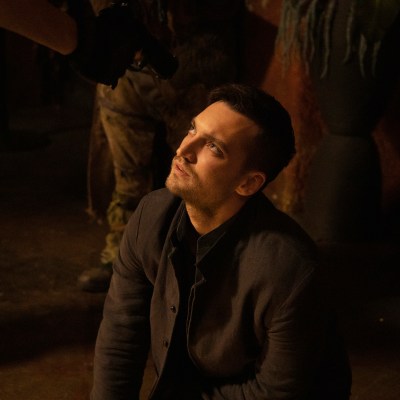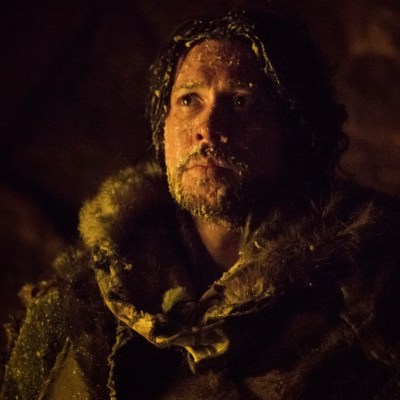The 100’s Decision to Sideline Clarke is Part of a Larger Season 7 Problem
The 100 has spent much of its final season exploring new characters and lore. But as a result, it's unfortunately left its protagonist behind.

The following contains The 100 spoilers.
Heading into the final season of The 100, most fans didn’t really know what to expect. After a penultimate season that catapulted the characters we knew over a century into the future, deposited them on an unknown planet and introduced literal bodysnatchers pretending to be gods, pretty much anything seemed possible.
For the most part, Season 7 has swung for the fences, establishing new and complex sci-fi concepts involving teleportation stones, time dilation, and a planet inhabited by another, completely different human civilization. It’s been a ton of fun to watch, but it’s often felt as though Season 7 has been relentlessly expanding The 100’s overall narrative, rather than contracting it. This doesn’t feel like a show that’s working on wrapping things up as its final episodes loom in the distance, or maneuvering its characters into a place that’s anywhere close to a satisfying end.
One of the most frustrating results of this disconnect is Season 7’s decision to sideline its primary protagonist. Love her or hate her, Clarke Griffin has been the heart of The 100 from the very first episode, and her journey has always – rightfully – been at the center of the show’s story. But now that we’ve reached the series’ final season, that suddenly no longer feels like the case. At the moment, Clarke’s story feels like an afterthought. She has no real arc to speak of, has barely even appeared onscreen for half the season, and generally takes a narrative backseat to any one of a half dozen other characters when she does show up. As a fan, this decision is both jarring and disorienting, precisely because Clarke’s presence has been so instrumental to this show, for both good and ill.
Over the course of The 100, we’ve watched Clarke grow up, becoming a leader, a mother, and a monster by turns. Willing to make difficult choices and commit horrible atrocities in the name of the people she loves, Clarke is a survivor who has saved the world and lost everything more than once. She’s failed spectacularly at times but also fought to build a life out of the ashes of those various destructions, carried her weight in grief, and picked herself up in the face of terrible odds over and over again. Clarke’s a hero who has more than earned that moniker, and on some level, we were likely all hoping this final season of The 100 might finally give her some peace.
Well, the joke’s on us, because at the moment, she’s not really doing much of anything.
The 100 has always been deft at balancing stories between an ever-evolving cast while keeping a core group of characters firmly at its center. This season, that’s largely still true, at least in the sense that the narrative is juggling a wide array of perspectives and plot arcs. But it does seem – and admittedly some of this appears to be out of the show’s control, thanks to external events affecting the series’ actors – as though Season 7 is purposefully ignoring many of the characters that should be central, narratively speaking, to whatever ending it’s trying to craft.
Hope, Diyoza and Octavia’s newfound family is interesting, and the story of their time on Sky Ring is compelling. So is the bottle episode that backfills Bellamy’s lost time and depicts his weird religious conversion. The hour that gives us a more detailed look at the world of Cadogan and his Disciples on Bardo is both disturbing and entertaining. And I loved “Anaconda,” even though it’s an episode that only exists to serve as the backdoor pilot for a potential spin-off we may never see. Yet, even though all those things are true – this is also the final season of the entire show! It’s impossible to feel like these stories – as good as they are – deserve entire episodes to themselves when there are precious few hours remaining in this universe.
With just a handful of episodes left, it’s ludicrous that we’ve seen so little of Clarke in Season 7, particularly after all she went through in the previous season. (Most of which we’ve barely seen the fallout from.) She lost her mother, nearly died (again), was possessed by the consciousness of a Prime that planned to take over her body forever, and was once again responsible for the deaths of a large number of people, as well as the total destruction of Sanctum’s (admittedly, yikes) way of life.
After all that, it feels as though the series’ final season should be a reckoning, of sorts, a chance for Clarke and the rest of her people to finally, truly “do better” as Monty urged them in his farewell message on the ship that brought them to Sanctum. That these last episodes should not only show us our favorites healing, but also building a truly new life with a future that might actually last for once. Instead, a dark commander is terrorizing the Grounder clans as Bill Cadogan, of all people, is preparing humanity to fight another war against some sort of unknown assailant.
Don’t get me wrong – Season 7 has been building some fascinating lore around Second Dawn, the Anomaly Stones, and humanity’s true path to the stars. But the rotating narratives have overextended The 100’s storytelling capability to an almost laughable degree. It’s only now, at the conclusion of the season’s eleventh episode that it feels as though its main narrative might finally begin. At least most of the main characters are finally in the same place, for once.
But while it’s great that Clarke has finally reached Bardo, the most troubling aspect of Season 7 is that her presence suddenly feels superfluous. She doesn’t have much in the way of a story of her own this season, beyond the fact that once again someone wants to use her for their own nefarious ends. And she’s been onscreen so infrequently that even her moments of actual growth (her decision to take a step back and let Raven talk Echo down from genocide, for example) feel like accidents of timing rather than deliberate choices. Clarke has gone from one of The 100’s most powerful characters to one who barely has any interiority or agency, and the show hasn’t given us any on-screen reason for this decline.
As irritating as Bellamy’s extended absence has been, at least the show made a half-hearted attempt to explain it. Clarke just exists in a strange there/not-there limbo. She deserves better. And The 100 does too. Here’s hoping we haven’t already said “may we meet again” to her character without realizing it, and that she gets the send-off she’s earned after so many seasons of struggle.


